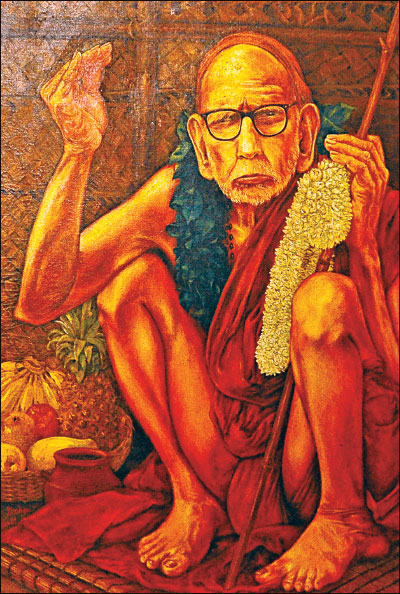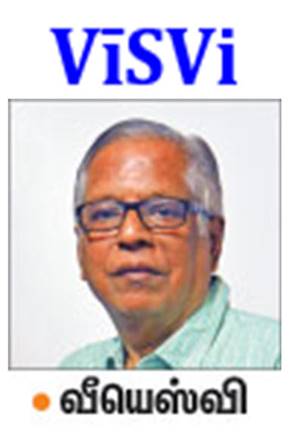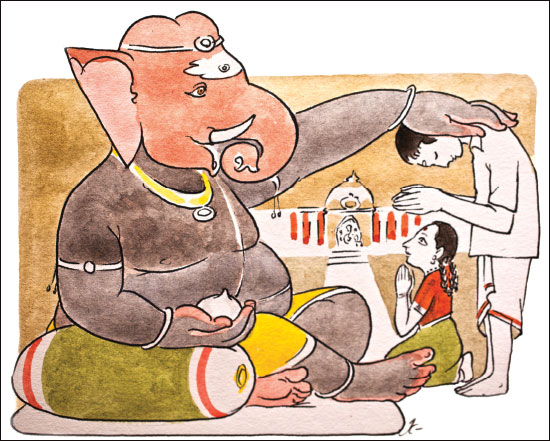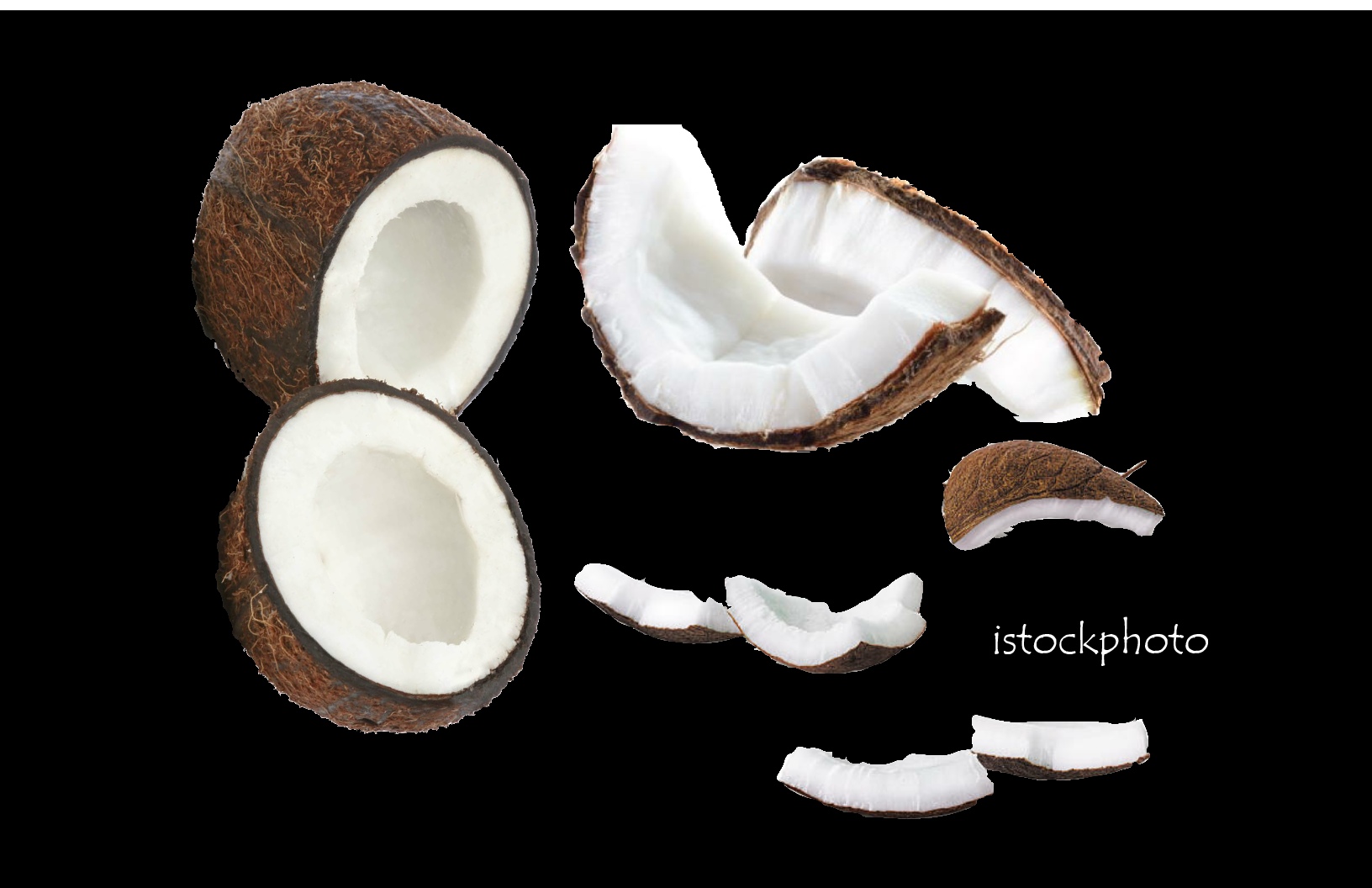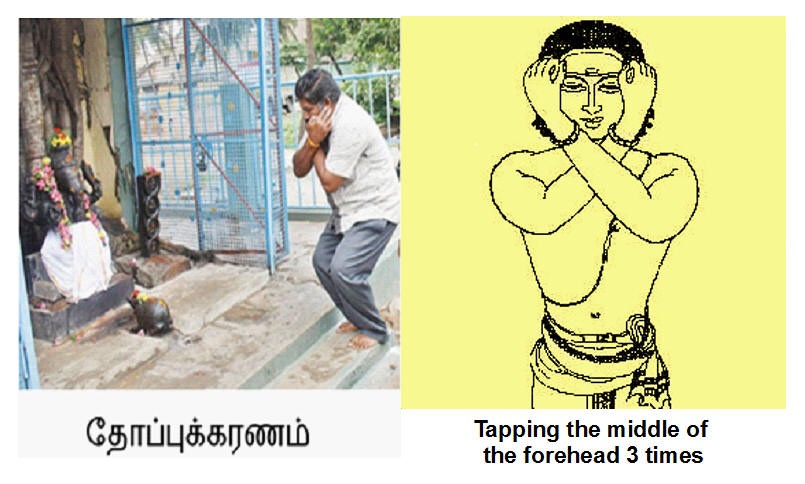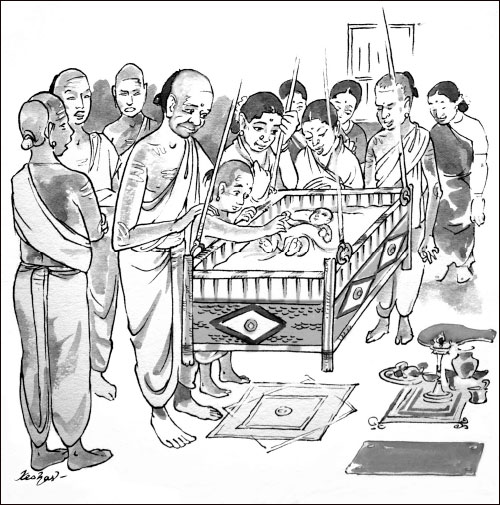Mahaperiyava01
Mahaperiyva20180424

|
கற்பகத்
தருவே சரணம் |
Surrender unto you, the celestial Wish-tree |
|
தெய்வத் திருவுருவே சரணம் |
Surrender unto you, the Blessed Divine Form |
|
ஞானக் கருவே சரணம் |
Surrender unto you, the essence of Wisdom |
|
ஜகத்குருவே சரணம்
சரணம் |
Surrender unto you,
Jagatguru (World teacher) |
|
|
|
I hesitated initially, when Sakthi Vikatan Editor asked me to write a
series on the life of Mahāperiyavā as the central persona.
I feared the small head would not bear the weight of a palmyra fruit.
The editor having spoken on the telephone, showed up unannounced in
person in a few days. I
explained (admitted to him) my trepidation.
That
did not deter him.
“Let
us christen the title of the series,
'Mahāperiyavā.'”
so saying, he made me commit to his proposal.
I consented thinking this was an injunction from Parama Guru (Supreme
Guru). Paying homage to the feet of Mahā Periyavā, I began writing. In
this series, I promise (assure you) there is no hand of mine in the
color and richness of the writing style.
The five parts of 'Deivaththin
Kural'
published in 101 small books by Vikatan as 'Aruḷ Urai', are the basis of
my effort.
The articles, written by my senior Bharanidharan about Kāñchi Māmuṉivar
in Vikatan and Ganesa Sarma, the ardent devotee of Mahā Periyavā, I hold
as my enduring strength by my side.
I have many other authors'
books and articles as references. The discourses about Kāñchi Mahāṉ I
heard may be of use.
I write this series, ruminating on the Darśan of ambulatory deity
(Kāñchi Mahāṉ) and his blessings, the Vikatan editorial crew and I
received in Satārā in Mahārāṣtra state.
'Piḷḷaiyār
propitiatory mark (sign)'
Yearning to hear the voice of the ambulatory deity Kāñchi Mahāṉ, I
thumbed through the first section and fortuitously received Darśan of
Vināyakar. It is like the fruit slide and fall into the milk (the modern
Milk shake). It is proper to begin a work with Vināyaka Stuti
(panegyric), when you imbibe one drop from Life Ambrosial of Mahā
Periyavā.
The unique greatness of Tamil Nadu is the ubiquitous presence of
Piḷḷaiyār Temples: Streets upon streets, riverbanks, bases of trees… All
over Tamil Nadu, Piḷḷaiyār reigns supreme, enjoying a place of eminence
beyond measure, not accorded to other deities.
It is a special custom and tradition in Tamil Nadu to call him
'Piḷḷaiyār' with love and devotion. He is the elder son of Pārvati and
Paramēsvarar, the universal Mother and Father. The eponymous ‘Piḷḷai' is
a reference to Him by convention as the first and the foremost son. We
should not simply call him 'Piḷḷai'. The suffixal 'Yār' evokes respect,
which is the greatness of Tamil Nadu.
'Kumāraṉ'
means
'Piḷḷai'. All over India,
Kumāraṉ,
'Kumāraṉvāmi…
refer to the younger son Subramaṇi of Pārvati and Parameśvaraṉ. In
Tamil, we call him 'Kumarak-Kadavuḷ'. We don’t call him 'Kumāraṉār'. It
is simply Kumaraṉ without the suffixal 'ṉār'. We gave to the elder son
of the divine couple the name, Piḷḷaiyār to evoke respect.
Paramāchāriyār introduces Piḷḷaiyār in the reverential vein.
Next, why do we crack a coconut for Piḷḷaiyār?
Vignēṣvarar, looking at his father Īśvara, demands,
'Sacrifice
your head to me'.
Mahā Gaṇapathy wells up with love and affection, only when what is most
important is offered to him as sacrifice. Īśvara extended to us the
Anugraham (divine favor), by creating the three-eyed coconut as the
symbols of self-dedication and our readiness for a great self-sacrifice.
Kānchi Mahāṉ declares that the fragments scattering while the coconut
shatters, belong to the children. It is from a child he came to know the
truth.
Periyavā observed
Ćāturmāsya Viratam
in Nagapatinam in 1941. There, it is customary to break coconuts into
umpteen pieces. The children gather around so close there was barely any
room to break the coconuts.
The adults accompanying Periyavā chided and chased the children because
they feared the dashing children may topple and tumble Periyavā.
Ćāturmāsya Viratam =
'four
months Vow',
Austerity during the rainy season from July to October.
An audacious child challenged the dhoti-clad rule makers,
“What
right do you have to disinvite us after you break the coconuts for
Piḷḷaiyār?
When you shatter and scatter the coconut, it is our (God-given) right to
take the pieces. We will certainly make a foray to collect the pieces.”
The fast talk and the determination of the child impressed and persuaded
Kānchi Periyavā to a realization, it was true the children hold the
inalienable and God-given right to the Prasadam (of the shattered
coconut pieces)
Moreover, he expands and explicates the Vināyakar Purāṇam. What is the
beauty of a child? He or she should eat adequately to allow for growth
and development. The body should not lose weight. There is no beauty in
the fat body of a Sannyasin. The elderly fast in the night. It is not
appropriate and beautiful for a child (to fast).
For a child, the luscious look is to sport a pot belly by eating a lot.
Before Piḷḷaiyār, people perform Tōppukkaraṇam. Mahavishnu taught this
physical form of homage to Piḷḷaiyār, according to an account.
Once, Piḷḷaiyār, the son-in-law of Vishnu (Viṣṇu) as a child grabbed the
discus and put it in his mouth. Vishnu was afraid he would hurt himself
in the mouth and was too strong to give it up easily.
It was impossible to retrieve the discus by demand, reprimand, fright, might or
sleight of hand. It occurred to Vishnu, if he made him laugh by some
means, the discus would fall out of his mouth and he could quickly
retrieve it.
Vishnu grabbed his earlobes and danced. Vinayakar had a sidesplitting laughter. The discus fell. Vishnu retrieved it safely.
Incarnation
happened!
Sēvappa Nāyakar who ruled from his capital Tañjai, supported the Vedic
Pundits, and helped them immigrate to Chōzha (Chola) country.
Govinda Dīkṣitar (GD) was the minister of Nāyakar.
He (GD) was a Hoysāḷar Karnataka
Brahmin. These Brahmins immigrated to the Kaveri riverside regions. GD’s
progeny came from the nearby Īcchaṅgudi
village. Nāgēsvara Sāstrikaḷ (NS)
belonged to GD’s lineage and his daughter was Mahālakṣmī.
Once,
NS
had been to Tiruvidaimaruthūr.
NS
had in his hand Mahālakṣmī’s astrological chart and met on his way
Gaṇapathi Sāstrikaḷ (GS). Mutual introduction took place.
NS
addressed GS,
“I
brought my daughter Mahalakshmi’s horoscope.
Please peruse the horoscopes of
your first son Subramaṇiyan and my daughter. If there is a
compatibility, my (NS)
supplication is that wedding takes place with the blessings of the
elders. At that moment, the
nearby temple bell rang.
“God
willing, it will happen...”
Saying so, GS took the chart and placed it on a ledge in the
prayer room.
NS
took leave of GS with hope.
NS,
on the way had Darśan of Mahāliṅgēsvarar and returned home.
Subramaṇiyan took the hand of Mahalaksmi a few months later. The wedding
took place in a simple manner according to Sāstraic traditions in Īcchaṅgudi
village. The domestic life was
virtuous and tranquil.
The couple named (christened in Christian tradition) the firstborn
Gaṇapathy. The child grew chubby. Mahalakshmi did not bear another child
for the next 10 years. The family felt it as deficiency. Mahalakshmi did
Tapas for birth of a second child.
The ten-year-old Ganapathy asked his mother,
“Ammā…
Why do you have a faded long face?”
She said,
“It
is nothing. I thought it will be nice to have a brother or a sister to
play with you.”
The days rolled…
Mahalakshmi’s supplication came to fruition. DharmaSamvarthiṉi conferred
her blessings. She was pregnant. Relatives and friends were happy. A boy
was born on May 20th 1894, that is at the confluence of Jaya
year, Vaikāsi month, 8th day, Aṉuṣa Nakṣatram, and an
auspicious day at 1:16 p.m. The baby was named Svāmināthaṉ.
Father Subramaṇiyan exulted, “Mahalakshmi, did you pay attention to the
baby’s face? Look at the
beauty and auspiciousness.” Mahalakshmi overcome with modesty and
joyousness said, “He peeled off from your mold.”
In the west, the common usages are:
He is made from the same mold.
He is the spitting image of his father.
He is the chip off the old block.
It came to pass that Paramāchāriar’s holy Avatāra took place.
(It will grow.)
